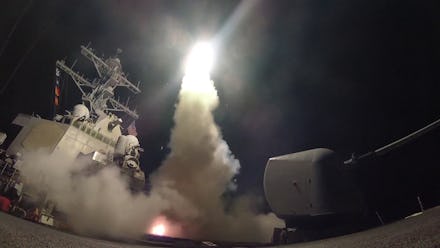Donald Trump has opened up a new war front. Here's what we know — and what's next.

On the 77th day of his presidency, Donald Trump used 59 Tomahawk missiles to open up a new war front.
The strike against Syrian President Bashar al-Assad's air force was different from any action the U.S. has taken in Syria since the outbreak of civil war there six years ago. It was the first direct strike against Assad's government. Early Friday morning in Syria, missiles crashed into the airfield that American officials say Assad used to launch a chemical weapon attack that killed dozens, including children, earlier this week. Six people reportedly died in the strikes. Nine civilians, including four children, were also reportedly killed. "Beautiful babies were cruelly murdered in this very barbaric attack," Trump said in a statement after the strike. "Years of previous attempts at changing Assad's behavior have all failed, and failed very dramatically." (You can watch his comments on Mic.)
The speed with which Trump ordered this attack is notable. The world reacted in horror on Tuesday as pictures emerged of Syrian parents holding bodies of children who had been gassed. By Wednesday, Trump was suggesting he would be the defender of those victims — and saying his view on Assad had changed. The next day, the president took decisive action. (Watch video of the strike on Mic.)
"I think it does demonstrate that President Trump is willing to act when governments ... cross the line in the most heinous of ways," Secretary of State Rex Tillerson told reporters Thursday night. National Security Adviser H.R. McMaster said Trump was informed immediately of the chemical attack. From that moment, McMaster said, the president was engaged in developing options to respond to Assad.
This is Mic's daily read on Donald Trump's America. Take a deep breath. We're here to help you make sense of all this.
A new war:
• Today: President Donald Trump has attacked Syrian government forces. Here's what we know.
• More: For now, the U.S. is not planning increased military operations in Syria.
• Even more: Russia — Syria's main backer — is not pleased. This is a little awkward.
• Yes, more: Political leaders were largely supportive of the strike — but stressed Trump needs congressional support if he wants to go further.
• Trump's agenda today: Meeting with Chinese President Xi Jinping at Mar-a-Lago.
A "one-off" against one target
This was a limited strike. At an airfield near Homs, the center of the uprising that became today's civil war, U.S. missiles struck simultaneously to destroy hangars that house government aircraft. The strike "severely damaged or destroyed Syrian aircraft," the American military said. The U.S. took precautions to avoid areas of the base where Russian assets were stationed.
The immediate question is whether this attack was a lone strike or the first of many. For now, Tillerson said the strike does not signal a change in America's military stance toward Syria. A Pentagon official told Reuters it was a "one-off." Instead, American officials said, this strike focused on hampering Assad's ability to launch future chemical weapons attacks. But McMaster said Syria still has the ability to launch those attacks, raising the question of whether this strike was more of a deterrent than a game-changer.
How the world is reacting
American officials have ratcheted up the language against Russia all week, and Tillerson let loose on Thursday night. He said Russia "has failed in its responsibility" to monitor Assad's chemical weapons. "Either Russia has been complicit or has been incompetent on its ability to deliver," Tillerson said. (The secretary of state will be in Moscow next week. Watch that meeting.)
On Friday, Russian President Vladimir Putin called the attack a "violation of the norms of international law." He called the attack "trumped-up" (yes, his spokesman apparently said that). The response is notable given the U.S. warned Russia the strike was coming. But the so-called "violation of international law" was self-fulfilling: Russia, Assad's main backer, has used its United Nations Security Council veto to block international action on Syria. Now, however, Russia is calling for its own emergency U.N. meeting.
And we don't even know how China reacted. The strike came as Trump dined with Chinese President Xi Jinping at Mar-a-Lago in Florida. Trump continues to host Xi on Friday as the world grapples with news of the American intervention against Assad. The president is expected to discuss another hotspot: North Korea, whose government China backs. There's been some increased hostility between the U.S. and North Korea lately.
More: The price of oil jumped following news of the strike. (CNN) Hillary Clinton has eerie timing: Hours before the strike, she said the U.S. should attack Assad's airfields. (Mic) Assad said the attack was "irresponsible," "shortsighted" and not based on "true facts." (Mic)
How American leaders are reacting
The response from Congress was somewhat mixed. Some on the Hill took a line of support for this move, but asked to be consulted next time. Democratic and Republican leaders alike, especially in the Senate, showed unity in their message that Assad needed to be punished after the chemical attack. But there was a clear message that Trump should go no further without seeking support in Congress. Read a rundown of political responses to the attack from Mic.
Not everyone, however, was supportive. Sen. Rand Paul (R-Ky.) tweeted that Trump did not have the authority to attack Syria. And progressive grassroots organization MoveOn.org called Trump's strike "illegal and unauthorized." Here's a running list of politicians opposed to the strike.
t's worth noting how many politicians, particularly Republicans, were opposed to a strike in 2013 but backed Thursday's strike. Politico has that story. And of course: Here are 45 times Trump said attacking Syria was a bad idea and might start World War III.
Stay tuned to mic.com/navigatingtrumpsamerica on Friday for more fallout from Trump's attack on Syria.